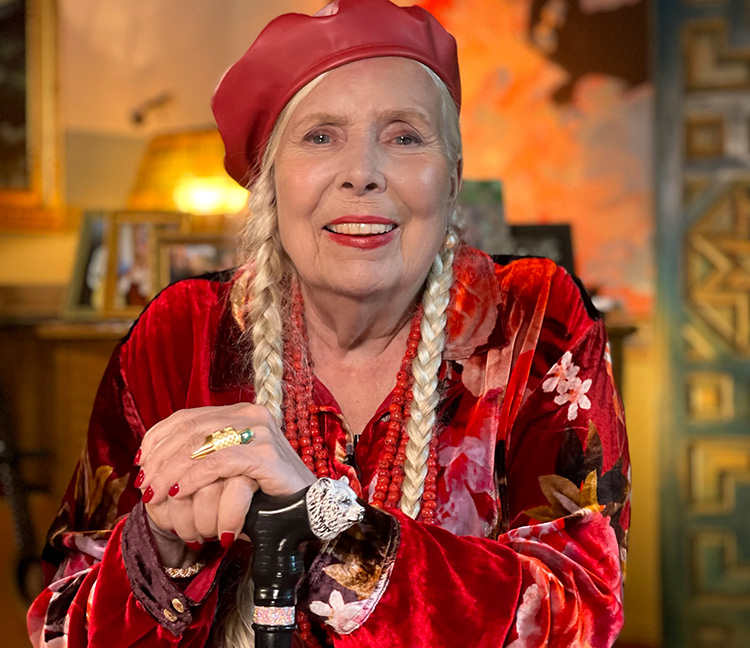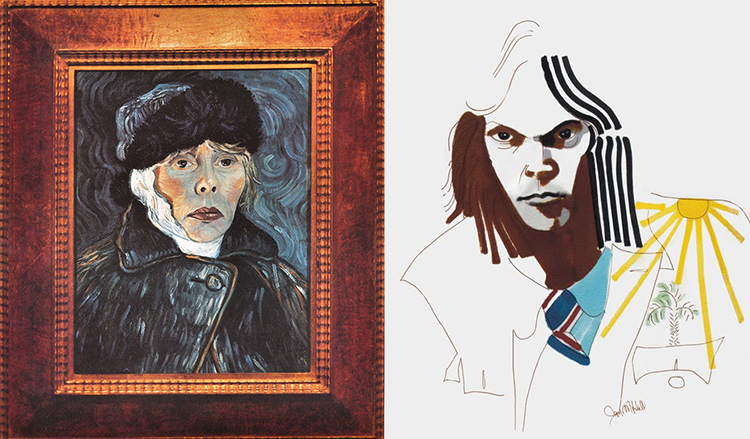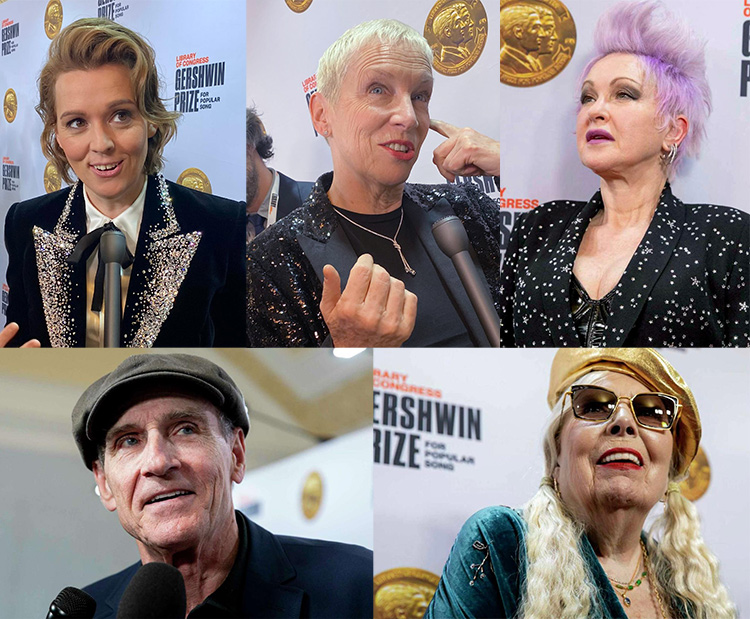ENTER YOUR EMAIL TO RECEIVE OUR WEEKLY NEWSLETTER
Paying Tribute to Joni Mitchell
The multi-award-winning singer, songwriter, environmentalist, activist—and painter—has always been in tune with the times
By Karen Feld

Resilient and ready for her latest award: A portrait of Joni Mitchell today. Courtesy of the artist.
. . . . . . . . . . . . .
March 30, 2023
Many of us who are pre-boomers and boomers grew up with the Canadian singer/songwriter Joni Mitchell, whose expressive face, long blond hair, and sound—“Blue,” “Chelsea Morning,” “The Circle Game,” “Coyote,” “Both Sides Now,” “500 Miles,” “Big Yellow Taxi”—first became familiar in the East Village back in the late ’60s and ’70s, and have remained so as she evolved over the years from folk to jazz.
Now at age 79, this self-taught multi-Grammy winner and Kennedy Center honoree is being recognized by the Library of Congress with its top award, the Gershwin Prize for Popular Song. Mitchell—with her singular and blatantly honest and personal lyrics—is only the third woman to achieve this honor.
Unbeknownst to many, she’s a visual artist, as well—and painting, I propose, is as meaningful to her eye as music is to her ears. Her large and striking self-portraits flanked the stage at Washington, D.C.’s DAR Constitution Hall this past March, where, during an evening for VIPs that was pre-recorded for PBS, and is scheduled for viewing this March 31, Mitchell won the top prize in pop music. This resilient woman, who suffered a serious aneurysm in 2014, walked on stage and sang Gershwin’s “Summertime,” from Porgy and Bess, to an audience that included members of Congress, Supreme Court Chief Justice John Roberts, and fellow performers James Taylor, Annie Lennox, Cyndi Lauper, and Brandi Carlile.
“I always think that polio was a rehearsal for the rest of my life,” Joni has said. She had the disease as a child. More recently, an aneurysm left her temporarily unable to walk—or talk—yet again. But she relearned guitar by watching videos of where she’d placed her fingers.
Born in Alberta, Canada, in 1943, Roberta Joan Anderson turned first to art for companionship when she contracted polio at age nine, and then her music career was launched in the folk clubs of Greenwich Village and Carnegie Hall in the ’60s. Health issues, including Morgellons disease, involving annoying skin sensations, have all along plagued her.
Joni documents her life through her lyrics. Like many other women, I can relate to “Coyote,” the song Joni composed and sang in Martin Scorsese’s documentary “The Last Waltz.” She told the story from the point of view of having a passionate affair with a ranch worker who was called a coyote. Her affair with Sam Shepherd, whom she met while touring with Bob Dylan’s Rolling Thunder Review in 1975, was the inspiration.

Mitchell’s self-portrait as Van Gogh, with a bandage over the missing ear, became the album cover for Turbulent Indigo. Her sketch of the young Neil Young, in the ’60s, is shown in Morning Glory On The Vine: Early Songs And Drawings (Houghton Mifflin Harcourt, 2019).
. . . . . . . . . . . . .
What surprised me, as one who considers art my hobby, is that Mitchell regards herself first as a visual artist, for which she received training, and then a songwriter—which came naturally. She has said her painting career got “derailed by circumstance,” and depicted herself as a bandaged Van Gogh on her album “Turbulent Indigo.” Her self-portraits are expressive, colorful, and bold. She painted lyrical depictions of Bob Dylan and other fellow musicians. She once visited Georgia O’Keefe at her home in Santa Fe on her way back from a stay in Mexico. where she had collaborated with that jazz great, Charles Mingus. O’Keefe told Mitchell, “You can’t have it all,” to which she replied, “Yes, you can. I have my painting AND my music.” Joni no doubt inspired many other women born in her generation that yes, they, too, can have it all, whether art and music or career and family.
She was also frequently ahead of her time, recognizing and supporting issues affecting all of us. Even before the first Earth Day, held in 1970, Joni alerted us to the impending environmental crisis, doing so in an almost subversive way. With an easy-to-sing chorus and the audience joining in, Annie Lenox—a devoted fan and visual artist, as well—led the cast at the PBS taping earlier this month in singing “Big Yellow Taxi.” Mitchell had composed that environmentalist’s protest song half a century ago; it’s even more relevant today. “They paved a paradise and put up a parking lot … don’t know what you’ve got till it’s gone.”
I remember seeing her perform “The Circle Game,” “Woodstock,” and “Big Yellow Taxi,” at the Washington, D.C. demonstration that followed the Three Mile Island meltdown in 1979. The intention at that protest event, with 100,000 attendees, was to bring national attention to the potential dangers of nuclear reactor accidents. (In D.C. back in those days, insiders had their bags packed. Only Covid, years later, echoed the intensity of fear that accident provoked.) Also at that event, Annie Lennox played piano and sang a jazz rendition of Joni’s hit “Both Sides Now.” Wearing a gold beret and a flowing blue velvet dress, Joni had a standing ovation while throwing kisses to Lennox, who said, “I wouldn’t be standing here as a singer and songwriter if I hadn’t heard Joni.”

A singers’ evening: Brandi Carlile, Annie Lennox, Cyndi Lauper, James Taylor, and Joni Mitchell herself convene for the Gershwin Prize Award. All photos were taken by this article’s author, Karen Feld.
. . . . . . . . . . . . .
Every song presented at the event was connected to a story and to Joni’s art, according to producer Ken Ehrlich. And all the musicians were personally selected by her. Many talked about jamming at her home in L.A., first in Laurel Canyon and later in Bel Air. The British folk-rock singer Marcus Mumford said, “It’s been a pleasure to play in her band and sing at her house.” He sang “Carey” in her honor.
Brandi Carlile, a close friend and protégé of Joni, was instrumental in pulling the talent together, as well as urging her to step on stage and perform. It was Carlile who got her to sing on stage at the Newport Folk Festival after a 20-year absence in 2022. She called her mentor “a truth teller.” Carlile added, “her art and music shine on. I’m a proud disciple of Joni’s. She paved the way and doesn’t know how much she’s prepared me for my life.”
Mitchell had an impact on Bill and Hilary Clinton, as well. Her song “Chelsea Morning”—one of many popularized by Judy Collins, but seemingly overlooked during the recent D.C. taping—was the inspiration for the Clintons naming their daughter Chelsea in 1980.
The country music singer-songwriter Garth Brooks pointed out on video that Joni was the first artist who spoke out about what it was like being a woman navigating a male world. “She taught me how to paint with words, sound, and paint,” he said.
James Taylor, wearing his signature cap, talked about spending many nights at Joni’s house in the ’70s and “the purity of her sound.” He called her “a national treasure” and sang “California.”
Carole King, in a video tribute, said she realized that she and Joni do the same things in a different way. “Joni goes to creativity—that’s her natural habitat.”
Like James Taylor, Graham Nash, another of Joni’s exes, who met her in 1967, talked about her resilience and sang “A Case of You.” Nash wrote “Our House” when he was living with her. Fifty years ago, Joni wrote the very personal “Blue” when they broke up. Her album, also named “Blue,” was considered raw at the time. Not many in the business were willing to show a side as vulnerable as Joni did, repeatedly. Perhaps that’s why so many of us could relate. Cyndi Lauper performed the song for the March 31 PBS special.
Others paying tribute to Joni on stage included the R&B and jazz singer Ledisi, the Beninese pop singer Angélique Kidjo, the Canadian jazz pianist Diana Krall, and the jazz pianist Herbie Hancock. In the audience were Members of Congress, Wonder Woman Lynda Carter, singer/songwriter Paul Williams, with whom Joni performed at the McGovern for President concert in 1972, arts and public broadcast supporter Sharon Percy Rockefeller, Pat Harrison, president of the Corporation for Public Broadcasting, and former CIA director Bill Webster.
“Just because she is, she has, she’s done it—her beauty, her instinct,” Annie Lennox said about Joni. “It’s like the strands of tapestries.”
When Joni stepped on stage, she exclaimed, “My God, it’s overwhelming.” Then she sang “Summertime” from Porgy and Bess by way of gratitude to George and Ira Gershwin, whose Popular Song prize she had just won. But next she surprised everyone when she leaned against the piano and at the urging of Brandi Carlile belted out the 1966 hit of her own, “The Circle Game.” The cast and audience joined in with “And the seasons, they go round and round.”
The closing words were ones of hope. Librarian of Congress Carla Hayden, wearing a bright red silk jacket and surrounded on stage by House Speaker Kevin McCarthy and Senate Pro Tempore Patty Murray, said Joni “has truly helped all of us look at “Both Sides Now.” “You have brought so many people together, and you are going to bring both sides of Congress together right now.”
The refrain that was heard from the stage? “OK, let’s do it.”
Karen Feld, an award-winning writer, penned a Washington-based syndicated personality column for many years, chronicling social history through the intersection of politics and entertainment. She also dished on-air political gossip weekly with Joan Rivers.
Read more by Karen Feld:











